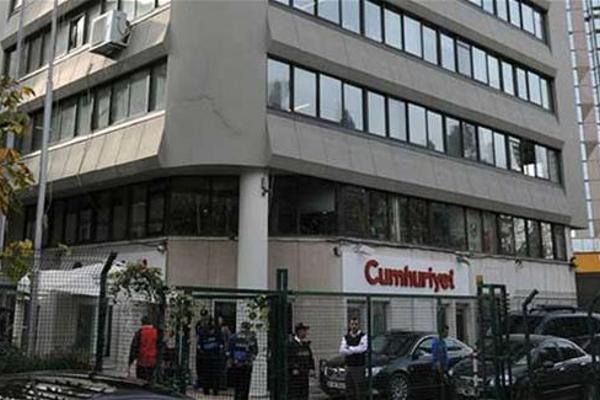Prosecutors demand jail for Turkish daily Cumhuriyet columnists, executives
ISTANBUL


The former editor-in-chief of the daily, Can Dündar, was named as the prime suspect in the indictment prepared by the Istanbul Chief Public Prosecutor’s Office.
The charges directed at the suspects include “membership of an armed terrorist organization” and “helping an armed terrorist organization while not being a member of it.”
Prosecutors are seeking between 7.5 and 15 years in prison sentence for Dündar, editor-in-chief Murat Sabuncu, IPI Board Member Kadri Gürsel, Aydın Engin, Bülent Yener and Günseli Özaltay for “helping an armed terrorist organization while not being a member.”
CEO of the daily Akın Atalay, Mehmet Orhan Erinç and Önder Çelik are charged with “helping an armed terrorist organization while not being a member” and “abusing trust,” with the prosecutor demanding between 11.5 and 43 years in jail for them.
Between 9.5 and 29 years in jail is demanded for Bülent Utku, caricaturist Musa Kart, Hakan Karasinir, Mustafa Kemal Güngör and Hikmet Aslan Çetinkaya on the same charges as those directed at Atalay, Erinç and Çelik.
In addition, the prosecutor sought between 7.5 and 15 years in prison for journalist Ahmet Şık for “helping and being a member of the PKK and the DHKP/C.”
Şık and journalist Nedim Şener were jailed as part of the controversial Oda TV case in 2011. Both spent more than a year in prison while awaiting trial before the publication of Şık’s book, titled “The Imam’s Army,” which focused on the Gülen movement’s followers within the police and the judiciary at a time when the movement and the ruling Justice and Development Party (AKP) were close. The duo was eventually freed on March 12, 2012.
Şık was again arrested on Dec. 30, 2016 over several tweets and articles for daily Cumhuriyet.
The indictment stated that daily Cumhuriyet started its publishing life upon the orders of Mustafa Kemal Atatürk, the founder of modern Turkey, but around 2013 “it was seized” by the Fethullahist Terrorist Organization/Parallel State Structure (FETÖ/PDY), widely believed to have been behind the July 15, 2016 military coup attempt.
“Upon Can Dündar assuming his post, the daily entered another path diverting from the aims of its establishment,” the indictment read. “It became a defender and protector of [FETÖ/PDY, the outlawed Kurdistan Workers’ Party/ Kurdistan Communities Union (PKK/KCK) and the outlawed Revolutionary People’s Liberation Party-Front (DHKP-C)].
“By concealing the acts of terrorist organizations, Cumhuriyet far exceeded the right to make news or comments including heavy criticism, which is provided by freedom of press principles and universal law,” it added.
“Cumhuriyet started an intense perception operation, targeting the government of the Turkish Republic and President Recep Tayyip Erdoğan by using asymmetrical war tactics,” it also said, claiming that the newspaper “provided a basis for illegal politics.”
According to the indictment, Cumhuriyet “tried to legitimize the acts of the PKK terrorist organization.”
“FETÖ/PDY, which used [closed] daily Taraf before, chose daily Cumhuriyet to service some information and documents,” the indictment said, referring to Cumhuriyet’s report on footage of Turkish intelligence trucks bound for Syria in early 2014.
The indictment also noted that some of the suspects “had contact with users” of the ByLock smartphone application, which came to prominence after it emerged that FETÖ used it to communicate.
The indictment has been sent to the Istanbul 27th Heavy Penal Court.
